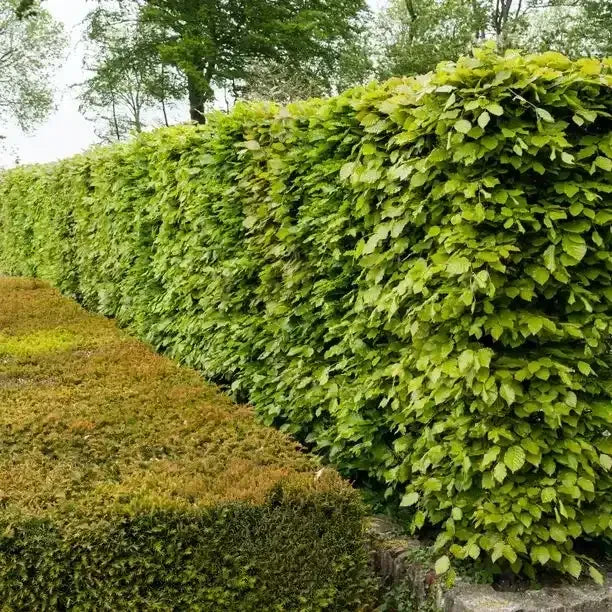What Does Mulch Do?
Mulch covers the soil around a plant in order to:
- Keep the sun off
- Trap moisture while allowing water in
- Make it harder for weeds to grow.
- Improve soil fertility by encouraging soil life (even plastic fabric mulch does this)
If it is going to be hard to frequently water and weed your new plants after planting, mulch is essential for your plants to thrive.
Establishing plants must still be watered, but a good mulch allows you to water less often.
Homemade mulch can be made of pretty much any garden waste, including fresh grass clippings, autumn leaves, chipped or shredded wood, and if you don’t mind the look, plain cardboard (not glossy) or newspaper, and old clothes, rugs or sheets, preferably made from natural fibre.
How does Mulch save new Trees and Hedges?
A newly planted tree has to grow new roots, which are sensitive to drying out, and vulnerable to competing weeds.
Mulch holds back weeds, shades soil, traps moisture, and feeds soil life.
Long term, mulch can transform the worst soils into rich, deep, dark topsoil.
Mulch can give you a summer holiday!w
- If your new trees are well mulched, you can water them thoroughly and safely go away for a week.
- If you are going away for 7-10 days, get someone to come in & water everything well once in the middle, twice if your soil type is dry (like sandy soil).
Plastic VS Organic Matter Mulch
You can buy long strips of woven polypropylene weed suppressing fabric, AKA black plastic mulch, which have revolutionised fruit and vegetable growing, and last for many years.
Or you can use any biodegradable vegetable matter, like our hemp mats for trees which slowly break down to feed the worms.
A great combo for homemade mulch is cardboard boxes over the soil to suppress weeds, hidden by a mixed mulch of shredded leaves and grass clippings.
What is the best mulch?
Some mulch is better than no mulch.
But you can mulch with so many green waste products from your garden: lawn clippings, autumn leaves, old straw (hay too, but it will have a lot more seeds in it), and if aesthetic appeal is not important, you could use old newspapers, non-glossy cardboard, cotton or wool clothes and sheets, hessian sacks – anything that rots and smothers, pretty much.
For flower beds and vegetable gardens
Hungry plants immediately want nutrients, so well rotted compost or manure are the best mulches
Cow, sheep, or goat manure are generally fine to use fresh, but horse manure should be aged for a year before it can be used on shallow rooted or newly transplanted plants: fresh horse manure is too high in nitrogen for sensitive roots.
For Trees and Hedges
The “other best” mulch for many garden uses, especially around trees and shrubs, is bark chips, which look nice and last for a relatively long time.
They break down slowly and so release their nutrients slowly, but over time they become part of the soil and encourage rich fungal life even on poor soil.
But bark chips are rarely free; wood chips, meaning the whole tree shredded up, leaves to heartwood, often are free because arborists want to dump them. They are also great for ornamental use, fruit trees, and just spreading around nooks and crannies to suppress weeds.
For large scale projects and farming
Plastic mulch fabric may not be pretty, but it does a lot to improve soil fertility simply by trapping moisture, which encourages soil life, which drives fertility.
Won’t fresh, undecayed mulch rob nutrients from the soil?
Fresh grass clippings, fresh woodchips, or kitchen waste will not suck nitrogen out of the soil when applied over the soil surface as mulch; likewise, un-composted plant material does not acidify soil.
Both of those ideas can be found in some gardening resources, and have a kernel of truth that does not apply to mulch.
Unlike compost, which can be dug into the soil or used for potting, mulch does not need to be well rotted, or rotted at all.
The major exception is chicken and horse manure, which can be too high in nitrogen (known as ‘hot’) when it’s fresh.
How to apply organic matter Mulch
Spread it a good inch thick on the ground around your plants every year.
- Don’t pile it up against their stems: leave about 6 inches clear.
- Don’t make the mulch layer too high – you don’t want the roots to grow up into it. 1-2 inches, applied yearly, is plenty.
Turning A Tree into Mulch
Professional tree removal services often chip a tree into woodchips and may charge you, or your neighbour, less if they can go on your property: great value mulch.
Do I Need Woodchips to Mulch Around My Trees & Hedges?
No, you don’t need to mulch trees and shrubs with woodchips specifically, you can use many other things including woven plastic. But woodchips are great for the job, cheap and easy to buy, and look natural, so they are a popular choice.
Woodchips make excellent mulch because they:
- Are long lasting
- Support soil life especially fungi
- Don’t blow away in the wind like grass, straw, or leaves
- Look like a natural woodland floor
- Can be acquired free from arborists mulching trees

 Secure, One-Tap Checkout
Secure, One-Tap Checkout
 Hand Picked, Delivered to Your Door!
Hand Picked, Delivered to Your Door! 1 Year Bareroot Guarantee
1 Year Bareroot Guarantee